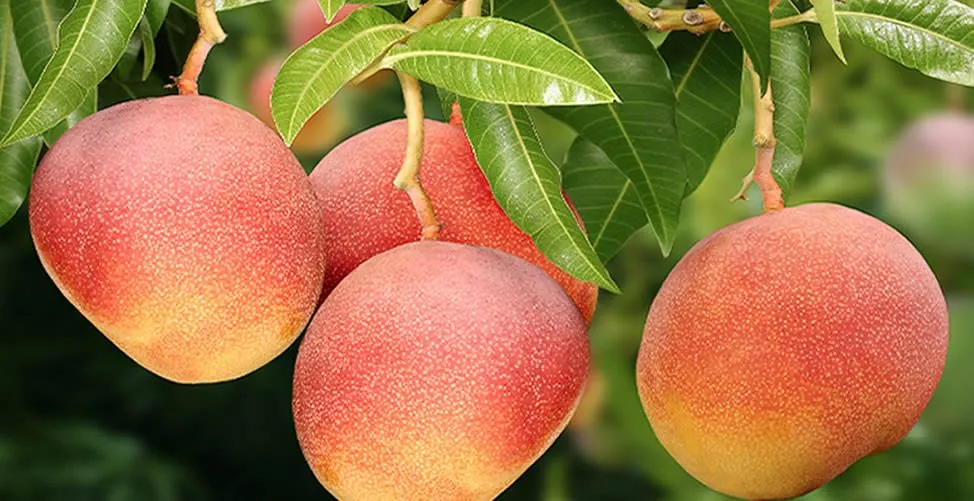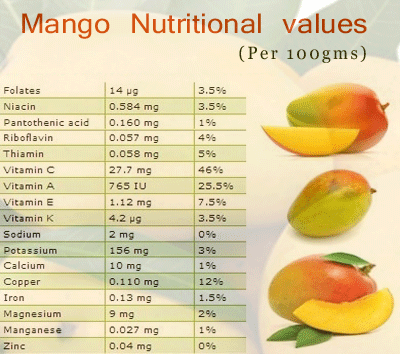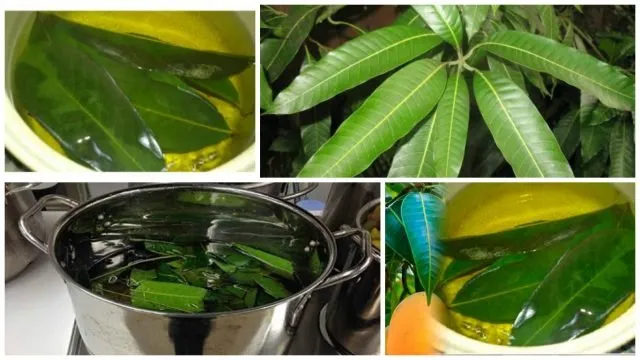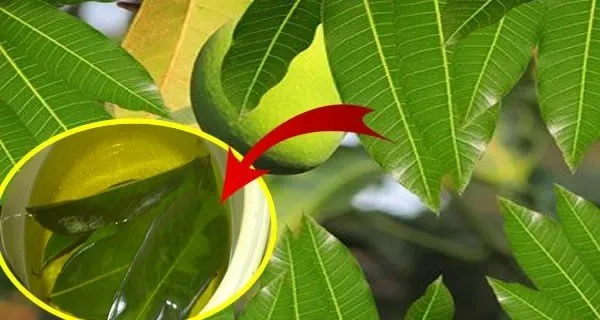The mango, is a tropical fruit, it is said to be native to South Asia, but nowadays it is grown all over the world, it is a very pulpy and juicy fruit, with an important nutritional content, considered an antioxidant for high concentrations of vitamin C, and in addition to having carbohydrates, which makes it have a high caloric value, which is essential to obtain enough energy that our body needs to face the day, such as sugar.

Source
Mango nutritional content

Source
The mango, is a fruit with a high nutritional content, to have a quantity of vitamins, but the proportions of can vary according to the type and quantity of the fruit. Mango is rich in proteins, among the main vitamins we can mention vitamin A, vitamin C, B vitamins, vitamin E, vitamin K; and many others, that can be observed in the nutritional table of the following image:

Source
Nutritional and medicinal properties of mango

Source
The amount of sugar it contains allows us to obtain good energy during the day.
Its high content of vitamin A help to significantly improve our vision.
The regular consumption of mango is excellent to avoid colon cancer, as it contains a lot of fiber, which helps to keep the intestines clean. It is very effective for people who suffer from constipation.
Mango contains potassium, which helps protect the heart and maintain normal blood pressure levels.
The mango is antioxidant for its high content of vitamin C, which helps neutralize free radicals and prevent heart and respiratory diseases, as well as the development of tumors.

Source
The mango to contain high levels of fiber, pectin and vitamin C, helps reduce blood cholesterol levels.
Mango contains a good proportion of vitamin E, which helps increase and improve sexual desire; activating the activity of sex hormones in men or women.
The antioxidants present in the mango, help to delay the aging of the skin and pigmentation.
The mangoes, for its high content of vitamin B6 or pyridoxine, helps the formation of antibodies in order to prevent diseases and strengthen the immune system.
In addition, the content of vitamin B6 in mangoes helps control moods. pyridoxine facilitates the production of serotonin, a substance that fights stress, depression and insomnia. and on the other hand, it also helps to improve the concentration and the power of the memory.
Medicinal uses of mango leaves

Source
Mango leaves have antioxidant and anti-inflammatory properties, because it contains phenolic compounds and carotenoids, which serve to combat the conditions involved with inflammation; inflammations that can be caused by sprains, bruises, bumps or arthritis problems.

SourceThe leaves of mango in infusions, are effective to control the levels of sugar in the blood. they are prepared by boiling the leaves and drinking in the form of a tea, this improves the body's production of insulin in a natural way; these should preferably be used tender, because that is how they preserve their properties.

SourceMango leaves have properties that help lower blood pressure and strengthen blood vessels, including problems with varicose veins.
The dry leaves of mango prepared as a tea, help control anxiety.
Take infusions of mango leaves, whether dry or fresh, help eliminate kidney stones.
Tea consumption of mango leaves, act as a tonic for the stomach and intestinal walls. Helps to heal the irritations that produce pains and cramps.
Scientific news about mango properties
"Scientists from Costa Rica and South Korea announced the discovery of anti-inflammatory and antioxidant properties in the leaves of a tree in the southern part of the Central American country.
These properties are found in the leaves of the tree popularly known as mabolo (Diospyros blancoi), collected in 2008 at the Golfito Wildlife Refuge, province of Puntarenas (south), in the Osa Conservation Area.
The discovery is the product of joint research between the National Institute of Biodiversity of Costa Rica (INBio) and the Korean Institute of Research in Biosciences and Biotechnology (KRIBB, for its acronym in English), the institutions reported in a statement.
The institutes will now continue with the development of formulations for the treatment of allergies and asthma based on anti-inflammatory properties, and also create cosmetic applications such as creams and lotions for the skin, due to the antioxidant qualities of the leaves that contributes to the prevention of aging processes and in the preservation of food. " Source